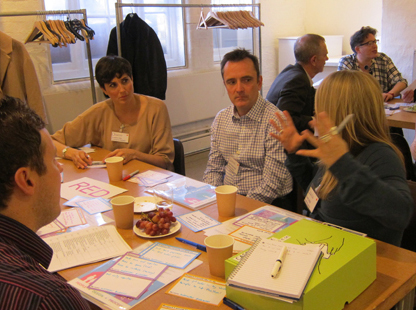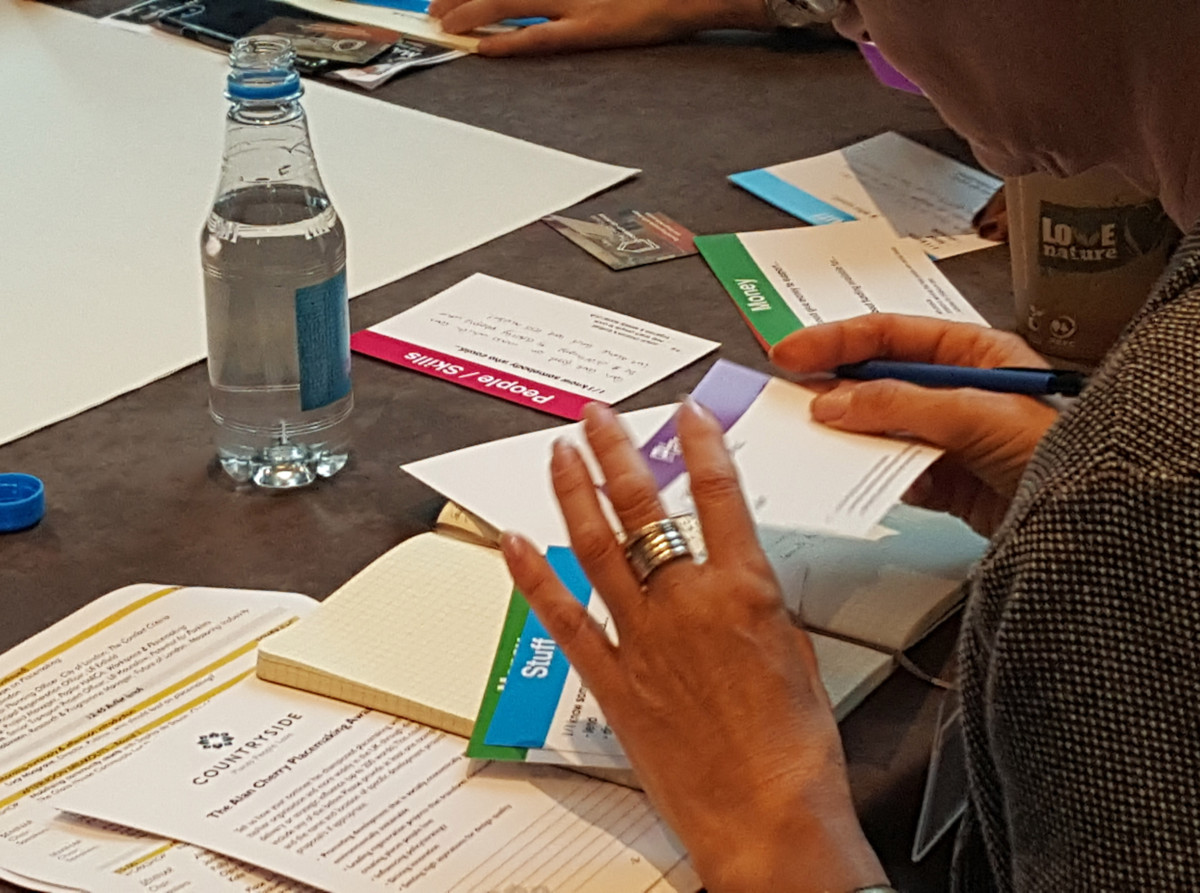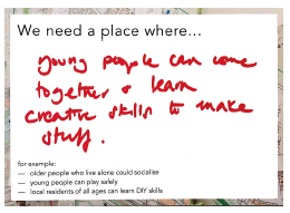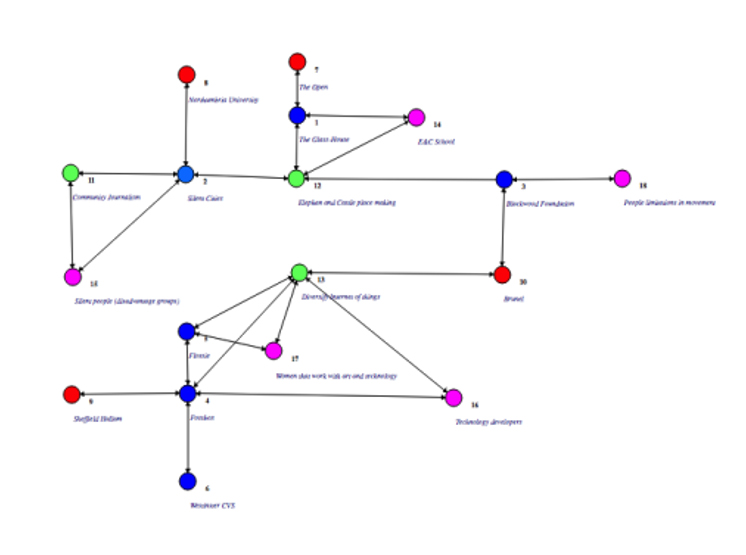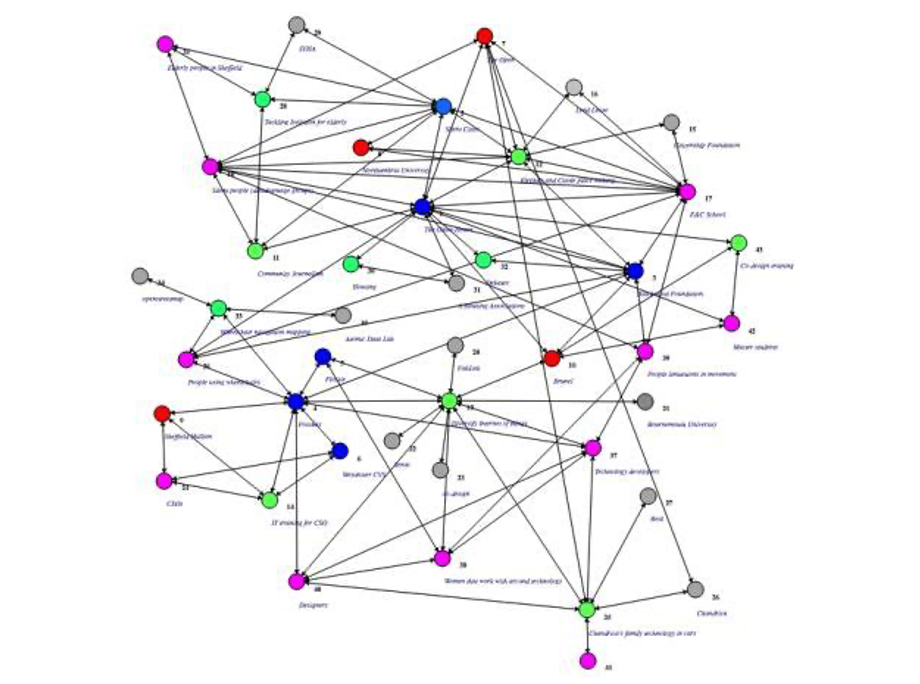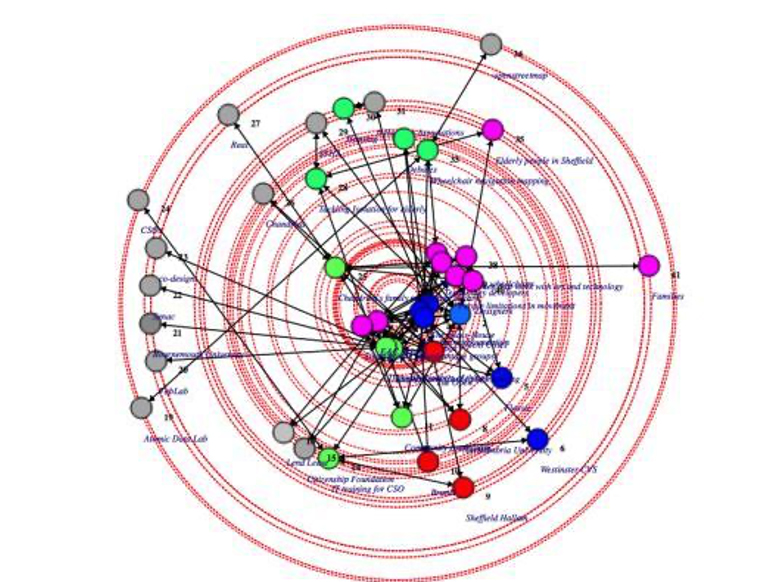Cross-pollination is a practical approach to incubating networks of place-based projects, collaborative research and innovation. The approach is based on the principle of creating a sharing economy of assets (skills, projects and resources) among different people and organisations, across disciplines and sectors.
The Story
The cross-pollination approach was created as part of an Arts and Humanities Research Council (AHRC) funded project ‘Scaling Up Co-design’ we did in collaboration with The Open University and other partners back in 2013-14. The research project involved 6 voluntary sector organisations and 4 academic partners who worked together to explore ways to create a sharing economy of assets (interests, expertise, resources & projects) in order to incubate new projects.
The essential question was how we could add value, impact and reach to our own and each other’s work, in the most creative and economical ways, that would also in turn contribute to the collective research and best practice around collaborative design.
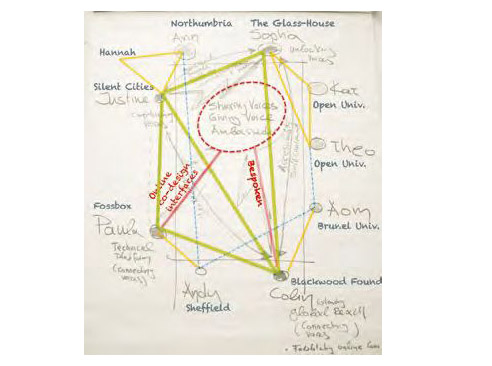
Our original cross-pollination workshop in the Scaling Up Co-design research project.
Through a simple workshop approach to identify shared values and goals, explore the projects we were all doing and points of connection, and then unearth and mobilise our collective assets, we quickly identified opportunities for collaboration. We also found that in the space of a year, our network of collaboration had grown organically, to include partners beyond the research project team and from across the public, private, community and voluntary sectors, and with a surprising geographical spread.
Our analysis also revealed that community and voluntary organisations moved from the periphery to the heart of collaborations. See the impact section for graphic representations of this analysis.
Experimenting with cross-pollination in a range of contexts
Since being involved in Scaling Up Co-design, The Glass-House has been increasingly interested in applying and further developing the cross-pollination method that we developed during the collaborative research, with a focus on design and placemaking. We have adapted and used it within a variety of different contexts and settings, working with communities, professionals and researchers. We have found it to be a useful tool for raising awareness of asset-based approaches and in exploring the potential for collaborative economies within the context of placemaking.
Cross-pollination to support sector-based conversations
One of the early applications of cross-pollination following the project was in a Glass- House workshop framed within the context of housing provision in 2015. This workshop came at a time in which policy changes had had a huge impact on social housing provider budgets and programmes, and many were feeling that they were not able to deliver their services as they would like to. Bringing organisations that had often operated as competitors together to explore this cross-pollination approach quickly illustrated the opportunities that collaboration offered.
Cross-pollination as a place-based approach
On a very practical level, working within the context of a specific location, we have found cross-pollination an effective way to quickly unearth, connect and mobilise resources, networks and projects across specialisms and sectors within a place-based community. Through a series of tasks and conversations, we ask everyone in the room to share what they are doing, what they would like to do, what resources they have and which ones they need. Creating an environment in which every participant, project and resource is valued, is hugely empowering and can be extremely productive in a short space of time.
Mapping at The Glass-House event Portobello Connects (Edinburgh, 2019)
Cross-pollination at Portobello Connects
In February 2019 we used cross-pollination within a Glass-House event, Portobello Connects, in collaboration with Architecture and Design Scotland, in the outskirts of Edinburgh. In this case we asked local people and organisations to map their ideas, projects and resources in the context of their local community.
One of the most striking and useful learning outcomes from this was the potential for cross-pollination to connect assets and projects of different scales within a larger conversation about the place and how it is working. We witnessed important connections being made, and the smaller initiatives being explored and valued alongside large-scale regeneration proposals. The workshop also revealed that many of the participants had been unaware of several of the initiatives happening in the area, and the workshop served a useful purpose of both raising awareness and collectively building confidence in their neighbourhood, as well as their community and what it had to offer.
For Portobello Connects, we also began exploring how to use digital media to help support the dialogue and networking following the workshop, among those attending and in order to extend the reach of the conversation.
Further examples of cross-pollination in action
Other contexts into which we have injected cross-pollination workshops include:
- Connected Communities Festival, convened by the Arts and Humanities, Cardiff, July 2014
- Future of London Placemaking Conference, London, June 2017
- Co-Creating Cities and Communities, convened by the Arts and Humanities Research Council, Bristol, July 2017
- Reconfiguring Place: High Streets, Blackpool, November 2019
- Empowering Design Practices LIVE, London, February 2020
Going digital
We are continuing to explore and develop our cross-pollination approach using both in-person and digital methods, through our Incubating Civic Leadership research project in collaboration with The Open University, Knowle West Media Centre and place-based partners in London and Bristol. This will focus in particular on the transitions from identifying shared goals and unearthing assets to catalytic processes that can help people move from conversation to collaborative action.
In March 2021, we combined the use of physical cards (sent to participants in the post before the meeting) and the online tool Miro to facilitate our first online cross-pollination workshop. While we all missed the experience of being in a room together, we found that the Miro board supported by our facilitation offered an effective workspace for quickly mapping and organising assets, and provided a useful format for capturing and sharing a record of our conversation. It also provides a digital space that we can go back to and build on at future meetings.
This iteration of the cross-pollination workshop has brought with it a renewed interest in the ‘What next?’ question. How can we support and enable cross-pollination to evolve and to help people move from connecting, asset mapping and ideas generation to concrete collaboration and projects?
A Dedicated Knowledge Exchange Project
In 2022, our strategic partnership with The Open University was awarded a knowledge exchange grant from the Arts and Humanities Research Council’s Place Programme, to support us continue to develop and test this approach as a tool for place-based conversations. Cross-pollination: Growing cross-sector design collaboration in placemaking, took our asset-based cross-pollination approach into communities in England, Scotland and Wales, aiming to help empower organisations and networks to work together to shape their local places.
The project saw us working with five different communities in Merthyr Tydfil, London, Gleadless Valley (Sheffield), Glasgow and Edinburgh, introducing cross-pollination into their local conversations and empowering local champions to organise their own cross-pollination activities. Our local partners included Merthyr Tydfil County Borough Council, Sheffield City Council, London National Park City, Edinburgh Voluntary Organisations Council, DTA Scotland, arts organisation Many Studios, and many other participating locally based groups and organisations.
We were also able to go back and revisit participants from our Portobello Connects event in 2029 which allowed us to look back on their experience of the event and learn about how it had influenced their work since, and about the legacy of some of the material outputs from the event.
Working with filmmaker Emma Crouch of I Say Raar, we produced a number of films capturing the cross-pollination journey of some of these communities, as well creating an explainer video demonstrating a cross-pollination workshop in action.
Developing an open-source resource pack
Empowering others to take up and use the cross-pollination approach was the primary objective of the Cross-pollination research project, so we followed the advice of our pilot groups, and developed an open-source Resource Pack which includes: information on the background of the approach, values and principles of the approach; case studies of how it has been used in different contexts; practical guidance on the key stages of cross-pollination; a flexible model for a cross-pollination workshop, and printable props to use in the workshop.
Looking ahead
We believe that cross-pollination has the potential to become a widely used approach to supporting more collaborative placemaking, and that it can play a key role in empowering communities to become active and valued contributors to shaping their neighbourhoods. We look forward to developing the next iterations of cross-pollination and to exploring how we can work together to empower others to use it.
Please get in touch if you would like to work with us to bring cross-pollination into your project and community.
Impact
In this analysis of the collaborative network by The Open University, you can see the rapid growth of the collaborative network over a period of one year.
- The network at the start of the project (10 collaborators, 3 community-based projects)
- The network after 12 months (32 collaborators, 10 community-based projects) Graphics courtesy of The Open University
In the second set of figures, in which the pink dots represent community and voluntary sector organisations, you can see that their position within the network has changed considerably after 12 months.
- The network at the start of the project
- The network after 12 months (Graphics courtesy of The Open University)
Here are some quotes from participants of our cross-pollination workshop with a focus on housing.
“Excellent, positive, engaging, energising were just some of the words used by participants to describe The Glass-House ‘Collaboration for Innovation in Place’ event. By 10 in the morning we were on our way back to the office after a whistlestop tour of projects in the pipeline from housing associations, housebuilders and researchers. No time to sit back and listen, we worked together to develop and promote the best projects, understanding and using our collective resources. Impressive, how quickly and effectively we all did it, from a standing (and fairly early) start.”
– Jane Briginshaw, then Head of Design and Sustainability, Homes and Communities Agency
Bringing together a cross section of people from different backgrounds but all willing to join in the process made the event both enjoyable and instructive.
The ‘Project I am Working on’; ‘Project I would like to work on’; and ‘Resource I can contribute’ cards were really inventive and I think everyone would have taken something away to use in their own organisation.”
– John Giesen, then Chief Executive, B3Living / Chair of Placeshapers
In our RESOURCES section
At our WE design event Reconfiguring Place: High Streets in Blackpool, in collaboration with The Open University and Historic England, we invited our participants to have a collective think about how they might work together to shape their town. Contributions from participants from mixed backgrounds and sectors, covering an age range from people in their teens to their 80s, are captured in this resource.
Scaling up Co-Design: A Journey of Collaboration in Research Practice and Communities
This booklet tells the story of Scaling Up Co-design Research and Practice, a collaboration between The Glass-House and The Open University, and a number of other academic institutions and civil society organisations. That set out to explore how the impact and reach of the work of civil society can be scaled up through co-design practices.
On our blog
Collaboration for Innovation in Place: a breakfast workshop
We brought together a diverse group of people and organisations with a shared interest in place, and in particular around housing, to explore what we might do differently through collaboration.
Portobello Connects: Mapping Magic on the Edinburgh shoreline
For Portobello Connects, an event in our 2019/20 Glass-House national WE design event series, we partnered with Architecture & Design Scotland to explore the power of collaboration in shaping places along Edinburgh’s shoreline communities.



